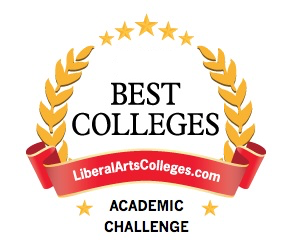
Photo: Occidental College. Retrieved from: www.oxy.edu
Occidental college is a private, co-educational liberal arts college that is home to ambitious young minds that go on to earn Ph.D.s and terminal degrees in big universities. Occidental College is lovingly called by its nickname “Oxy” and is one of the oldest liberal arts colleges on the West Coast. Students can expect rigorous academic programs, an active and diverse student body, and the best faculty. Many Oxy students have been awarded prestigious awards like the Rhodes Scholarship, Truman Scholarship, Watson Fellowship and Fulbright Scholarship.
The Core program comprises several subjects meant to enhance the liberal arts education in the institution. Students are asked to finish two first-year writing seminars, a specific number of courses in geography, languages and the arts, three courses in math and science, and a senior year comprehensive examination.
In Occidental College, there are various opportunities to challenge one’s self with projects outside the curriculum. Two of the popular ways to expand learning in various fields are student research and international study. In the former, the interested students can collaborate with a faculty member to complete various projects that may require laboratory work. Research fellowships are available for students. International programs include off-campus study in countries like Europe, Asia, Africa, the Middle East, Latin America and Oceania. This is a yearly option that many junior students take.
Occidental students also have a chance to work as interns in the United Nations Program in New York, but only a few brilliant students are selected. Other institutions accepting Occidental interns are the US State Department and international NGOs.
School History
In 1887, Occidental College was founded by a cluster of Presbyterian clergy and laymen, particularly James George Bell. The college opened to admit 27 men and 13 women students. The campus was moved from Boyle Heights to Los Angeles in 1898 in the Highland Park neighborhood. Occidental College became non-sectarian in 1910 when it cut its ties to the Presbyterian Church. In 1914, the school was relocated in Eagle Rock, covering 120 acres of undeveloped land.
In 1962, Occidental College rose to prominence when Time Magazine described the institute as a little giant, emphasizing the rapid growth of the institute after the war. In the late 1960s, student activist movements were many and frequent, as many students supported the anti-war campaign. During this time, the college also made positive changes in policies regarding students belonging to ethnic minorities.
Campus life
Student of Occidental College are socially active, intellectual and talented. Administrators and students work together to create a community that embodies mutual support, tolerance and respect. Residential Education and Housing Services manages all aspects of residential life on campus, and this administrative body takes charge of room draws, hall spreads, community forums and study breaks.
Students can choose which residence halls to live in, with trained resident assistants to help with moving in and adjusting to dorm life. RAs also act as mentors and trusted allies that make living on campus enjoyable. There are game nights or group discussions in residence halls. Some houses also offer off-campus educational trips.
Many students immediately join fun organizations like improvisation clubs, theatre clubs and writing clubs. Non-varsity sports like rugby are also popular. Many students join the student government and work hand in hand with the admin to oversee the activities around campus.
Financial Aid
Financial aid packages include grants, scholarships, work study programs, and student loans. To qualify for aid, the student must submit all documents on or before the deadline. The Financial Aid staff accepts inquiries over the phone, such as when a student cannot submit a specific requirement on time. But the documents must be submitted by mail, email or fax. The average loan a student owes after graduation is approximately thirty thousand dollars.

